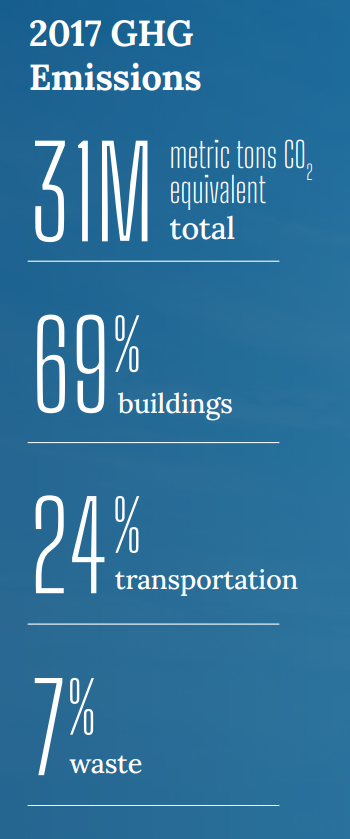Electrify Chicago
An independent tool for viewing City of Chicago building data
According to the
2022 Chicago Climate Action Plan,
69% of Chicago's emissions come from buildings, making
building emissions our biggest challenge and our biggest opportunity as a city
to tackle climate change. At Electrify Chicago, we showcase building performance using
publicly available data supplemented by community-submitted photographs and building
owners.
Start by looking at Chicago's buildings with the highest greenhouse gas intensity i.e. emissions per square foot. Large, efficient, buildings can perform much better than very inefficient small buildings on this metric.
New Article
📰 $30 Million In Missed Fines
The City Of Chicago failed to collect $30 million in potential fines from the building benchmarking ordinance, reducing transparency and accountability.
Legislative update! 🎉
As of late January 2024, legislation is being introduced to require new use more efficient forms of water and space heating, via the Clean And Affordable Buildings Ordinance (CABO), which will reduce the number of highly polluting and inefficient buildings that end up on this site.
If you're in Chicago,
write to your alderman to support the CABO!
Chicago Buildings by Greenhouse Gas Intensity
Note: Data includes large Chicago buildings with data from 2022, unless explicitly stated otherwise.
Note: This data only includes buildings whose emissions are reported
under the
Chicago Energy Benchmarking Ordinance. According to the City “As of 2016,
this list includes all commercial, institutional, and residential buildings larger than
50,000 square feet.” This dataset is also then filtered to only buildings with
reported emissions > 1,000 metric tons CO2 equivalent.
The latest year of data is from 2022, but we update the site regularly when new data is available, and some buildings may have failed to report that year, and only have older data available.
| Property Name / address | Primary Property Type |
Greenhouse Gas Intensity (kg CO2 eq./sqft) |
Total Greenhouse Emissions (metric tons CO2 eq.) |
|---|---|---|---|
|
The Lofts at 1800 Condominium Association
1800 W Grace St
| Multifamily Housing | 4.8 kg/sqft
Lowest 21%
| 882 tons
Lowest 50%
|
|
The Churchill Condominium Association
1255 N State Parkway
| Multifamily Housing | 4.8 kg/sqft
Lowest 21%
| 533 tons
Lowest 29%
|
|
Archer Place Condo Association
2272 S Archer Ave
| Multifamily Housing | 4.8 kg/sqft
Lowest 21%
| 338 tons
Lowest 11%
|
|
North Center Senior Housing, NFP (St. Vincent DePaul Residence)
4040 N Oakley St
| Multifamily Housing | 4.8 kg/sqft
Lowest 21%
| 404 tons
Lowest 17%
|
|
Bank Note Place Condominium Association, Inc
120 E Cullerton St
| Multifamily Housing | 4.8 kg/sqft
Lowest 21%
| 841 tons
Lowest 48%
|
|
3611 W Montrose Ave
3611 W Montrose Ave
| Multifamily Housing | 4.8 kg/sqft
Lowest 21%
| 241 tons
Lowest 4%
|
|
Crilly Court Condominium Association
1717 N Crilly Ct
| Multifamily Housing | 4.8 kg/sqft
Lowest 21%
| 313 tons
Lowest 9%
|
|
Natalie Salmon House
7320 N Sheridan Rd
| Multifamily Housing | 4.8 kg/sqft
Lowest 21%
| 245 tons
Lowest 4%
|
|
Camras Elementary -CPS
(CPS)
3000 N Mango Ave
| K-12 School | 4.8 kg/sqft
Lowest 21%
| 597 tons
Lowest 33%
|
|
Bennett Elementary -CPS
(CPS)
10115 S Prairie Ave
| K-12 School | 4.8 kg/sqft
Lowest 21%
| 326 tons
Lowest 10%
|
|
Newberry Math/Science Academy -CPS
(CPS)
708 W Willow St
| K-12 School | 4.8 kg/sqft
Lowest 21%
| 362 tons
Lowest 14%
|
|
Neil Elementary, Jane A -CPS
🕰️
(CPS)
8555 S Michigan Ave
| K-12 School | 4.8 kg/sqft | 348 tons |
|
Clifton-Fullerton Hall
2350 N Clifton Ave
| College/University | 4.8 kg/sqft
Lowest 21%
| 443 tons
Lowest 21%
|
|
3520 Lake Shore Drive CA
3520 N Lake Shore Dr
| Multifamily Housing | 4.8 kg/sqft
Lowest 21%
| 1,280 tons
Highest 37%
|
|
Mary Jane Richardson-Jones Apts
(CHA)
4930 S Langley Ave
| Multifamily Housing | 4.8 kg/sqft
Lowest 21%
| 716 tons
Lowest 41%
|
Data Source:
Chicago Energy Benchmarking Data
